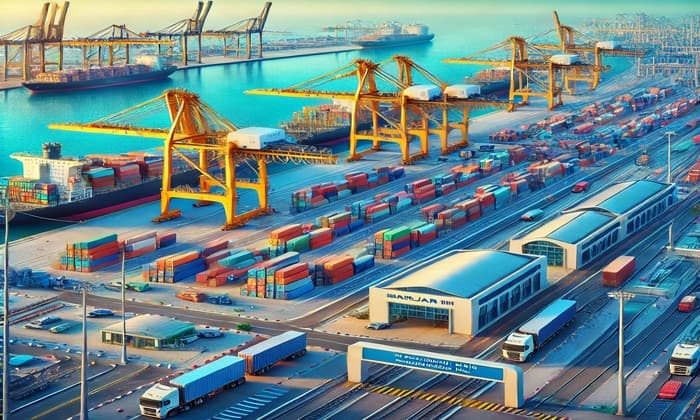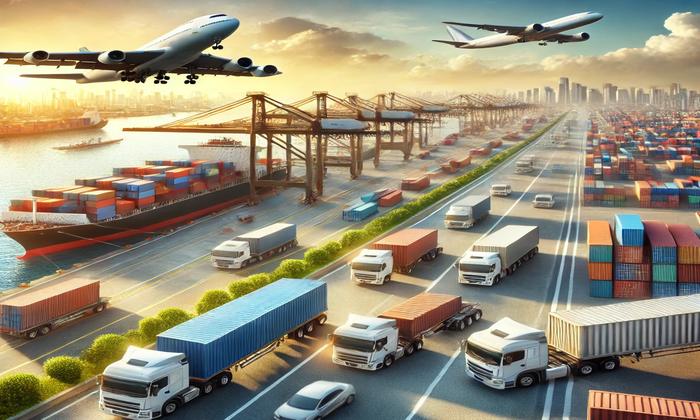
Understanding Logistics: A Comprehensive Guide
Logistics is a critical component of modern business operations, encompassing the planning, execution, and management of goods and services from the point of origin to the final destination. As global supply chains become increasingly complex, understanding the intricacies of logistics is essential for businesses seeking to optimize their operations, reduce costs, and enhance customer satisfaction. This comprehensive guide explores what logistics is, its key components, and how businesses can leverage logistics strategies to achieve a competitive edge.
What is Logistics?
Logistics refers to the coordinated and strategic movement of goods, services, and information within a supply chain. It involves various processes, including transportation, warehousing, inventory management, order fulfillment, and supply chain coordination. The primary goal of logistics is to ensure that products are delivered to the right place, at the right time, and in the right condition, all while minimizing costs and maximizing efficiency.
The Evolution of Logistics
The concept of logistics has evolved significantly over the years. Traditionally, logistics focused primarily on the physical movement of goods. However, with advancements in technology and the globalization of trade, logistics has expanded to encompass a broader range of activities. Today, logistics involves complex coordination between multiple stakeholders, including manufacturers, suppliers, distributors, and retailers.
The evolution of logistics management has also seen the integration of technology, leading to more efficient and streamlined operations. The history of logistics and supply chain management reflects a shift from manual processes to automated systems that enhance accuracy and speed.
Key Components of Logistics
Understanding the key components of logistics is crucial for businesses looking to streamline their operations. The main elements of logistics include:
- Transportation: Transportation is the backbone of logistics, involving the movement of goods from one location to another. It includes various modes such as road, rail, air, and sea. The choice of transportation mode depends on factors like cost, speed, and the nature of the goods being transported.
- Warehousing: Warehousing involves the storage of goods at different stages of the supply chain. Efficient warehousing ensures that products are available when needed and helps manage inventory levels. Warehouses also play a role in quality control and order fulfillment.
- Inventory Management: Effective inventory management is critical for balancing supply and demand. It involves tracking and managing stock levels to prevent overstocking or stockouts. Techniques such as just-in-time (JIT) inventory and safety stock help optimize inventory levels.
- Order Fulfillment: Order fulfillment encompasses the processes involved in receiving, processing, and delivering customer orders. This includes picking, packing, and shipping goods. Efficient order fulfillment is essential for meeting customer expectations and ensuring timely delivery.
- Supply Chain Coordination: Supply chain coordination involves the integration and synchronization of various supply chain activities. It ensures that all stakeholders work together seamlessly to achieve common goals, such as cost reduction and improved service levels.
The importance of warehousing in logistics cannot be overstated, as it provides a central location for managing and distributing products. Similarly, the key components of logistics management are interdependent, requiring a holistic approach to optimize the entire supply chain.
The Role of Technology in Modern Logistics
Technology has transformed the logistics industry, enabling businesses to operate more efficiently and respond quickly to market changes. Key technological advancements in logistics include:
- Transportation Management Systems (TMS): TMS software helps businesses plan, execute, and optimize transportation operations. It provides visibility into shipment status, tracks delivery performance, and helps reduce transportation costs.
- Warehouse Management Systems (WMS): WMS software manages warehouse operations, including inventory tracking, order picking, and space utilization. It enhances accuracy and efficiency in warehousing processes.
- Internet of Things (IoT): IoT devices, such as sensors and GPS trackers, provide real-time data on the location and condition of goods. This technology improves supply chain visibility and helps monitor factors like temperature and humidity for sensitive products.
- Artificial Intelligence (AI) and Machine Learning: AI and machine learning algorithms are used to optimize logistics processes, such as demand forecasting, route planning, and inventory management. These technologies help businesses make data-driven decisions and improve operational efficiency.
- Blockchain Technology: Blockchain offers a secure and transparent way to record transactions and track goods throughout the supply chain. It helps reduce fraud, streamline processes, and enhance traceability.
The role of technology in logistics is pivotal, with the impact of IoT on supply chain management being particularly significant. By integrating these technologies, businesses can achieve greater accuracy, efficiency, and transparency in their operations.
Sustainable Logistics Practices
Sustainability has become a critical focus in the logistics industry as businesses seek to reduce their environmental impact. Sustainable logistics practices include:
- Green Transportation: This involves using fuel-efficient vehicles, optimizing routes, and adopting alternative fuels, such as electric or hybrid vehicles. Green transportation reduces carbon emissions and lowers operating costs.
- Eco-Friendly Packaging: Sustainable packaging materials, such as recyclable or biodegradable options, help minimize waste. Reducing packaging size and weight also lowers transportation emissions.
- Reverse Logistics: Reverse logistics involves the return of goods from customers to the manufacturer or retailer. It includes activities such as recycling, refurbishment, and disposal. Efficient reverse logistics can help businesses recover value from returned products and reduce waste.
- Energy-Efficient Warehousing: Implementing energy-efficient lighting, heating, and cooling systems in warehouses reduces energy consumption. Solar panels and other renewable energy sources can further enhance sustainability.
These sustainable logistics practices not only benefit the environment but also contribute to cost savings and improved brand reputation. Green transportation in logistics, for example, is becoming increasingly popular as businesses look for ways to reduce their carbon footprint.
The Importance of Logistics in E-commerce
The rise of e-commerce has significantly impacted the logistics industry. Online retailers rely on efficient logistics operations to meet customer expectations for fast and reliable delivery. Key logistics considerations for e-commerce businesses include:
- Last-Mile Delivery: The last mile refers to the final leg of the delivery process, where goods are transported from a distribution center to the customer’s doorstep. Last-mile delivery is crucial for customer satisfaction and requires efficient routing and delivery management.
- Fulfillment Centers: E-commerce businesses use fulfillment centers to store inventory and process orders. These centers are strategically located to minimize delivery times and costs.
- Inventory Management for E-commerce: E-commerce businesses must manage inventory across multiple channels, including online stores, marketplaces, and brick-and-mortar locations. Real-time inventory visibility helps prevent stockouts and overselling.
- Returns Management: Efficient returns management is essential for handling product returns and exchanges. Clear return policies, easy-to-use return processes, and prompt refunds contribute to a positive customer experience.
The logistics challenges in e-commerce are unique, with the importance of last-mile delivery being particularly critical. As consumer expectations for fast and flexible delivery grow, businesses must adapt their logistics strategies to remain competitive.
Challenges in Logistics Management
Despite the advancements in technology and processes, logistics management faces several challenges. Common issues include:
- Supply Chain Disruptions: Natural disasters, political instability, and pandemics can disrupt supply chains and impact the flow of goods. Businesses must have contingency plans in place to mitigate these risks.
- Rising Costs: Fuel prices, labor costs, and regulatory compliance can increase logistics expenses. Businesses need to find ways to optimize operations and control costs.
- Capacity Constraints: Limited availability of transportation and warehousing capacity can lead to delays and increased costs. Effective planning and coordination are essential to manage capacity constraints.
- Regulatory Compliance: Logistics operations are subject to various regulations, including customs, safety, and environmental standards. Compliance with these regulations is critical to avoid penalties and ensure smooth operations.
Overcoming common challenges in logistics management requires a proactive approach, including risk management and strategic planning. Businesses must continuously assess and adjust their logistics strategies to navigate these challenges effectively.
The Future of Logistics
The logistics industry is continually evolving, driven by technological advancements, changing consumer expectations, and global trade dynamics. Future trends in logistics include:
- Autonomous Vehicles: The development of autonomous trucks and drones has the potential to revolutionize transportation. These technologies promise to reduce labor costs and improve delivery efficiency.
- Omnichannel Logistics: As consumers shop across multiple channels, businesses must integrate their logistics operations to provide a seamless experience. Omnichannel logistics involves coordinating inventory, fulfillment, and delivery across online and offline channels.
- Personalization in Delivery: Consumers increasingly expect personalized delivery options, such as same-day delivery, delivery time windows, and delivery to alternative locations. Businesses must adapt their logistics strategies to meet these demands.
- Resilience and Agility: The COVID-19 pandemic highlighted the importance of resilience and agility in supply chains. Businesses are focusing on building flexible and responsive logistics networks to adapt to changing market conditions.
These future trends in logistics indicate a shift towards more automated, customer-centric, and resilient supply chains. The impact of autonomous vehicles on supply chain logistics, for example, is expected to be transformative, offering new levels of efficiency and cost savings.
Conclusion
Logistics is a vital component of global trade and commerce, encompassing a wide range of activities that ensure the efficient movement of goods and services. Understanding the key components, challenges, and future trends in logistics is essential for businesses looking to optimize their operations and remain competitive in a rapidly changing market.
Whether you are a business owner, logistics professional, or someone interested in the logistics industry, staying informed about the latest developments and best practices is crucial. As technology continues to evolve and consumer expectations rise, the logistics industry will play an increasingly important role in shaping the future of commerce and trade.
The importance of logistics in global trade cannot be overstated, and businesses must continuously innovate to meet the demands of a dynamic market. From how technology is transforming logistics to the need for sustainable practices, the future of logistics is both challenging and full of opportunities.






